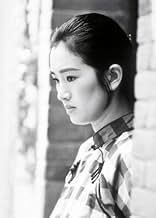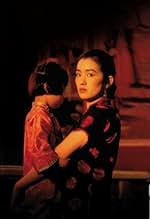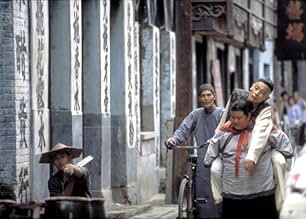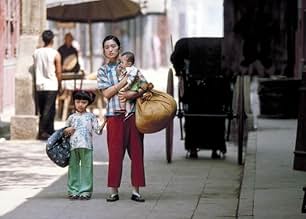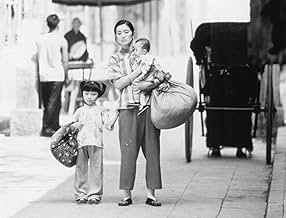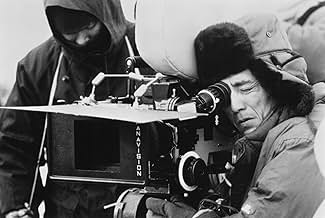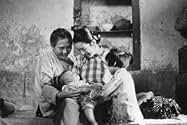Depois que Fugui e Jiazhen perdem suas fortunas pessoais, eles formam uma família e sobreviveram às difíceis mudanças culturais entre as décadas de 1940 a 1970, na China.Depois que Fugui e Jiazhen perdem suas fortunas pessoais, eles formam uma família e sobreviveram às difíceis mudanças culturais entre as décadas de 1940 a 1970, na China.Depois que Fugui e Jiazhen perdem suas fortunas pessoais, eles formam uma família e sobreviveram às difíceis mudanças culturais entre as décadas de 1940 a 1970, na China.
- Ganhou 1 prêmio BAFTA
- 5 vitórias e 6 indicações no total
Avaliações em destaque
Lantern was precisely contained within narrative walls, it abstracted life by placing us in the midst of turning cycles of life and wove cloths out of that turning in the form of rituals that marked passage; color, sound, weather, architecture. It was akin to a Buddhist mandala to me, a cosmic picture directing me to find my own place in the center of things, choose repose over madness.
Zhang by contrast here wanders unconstrained, under the auspice of history, aiming for a full chronicle of sorts of Chinese life as a family moves through the decades. The stage backdrop changes frequently; Civil war, Great Leap, Cultural Revolution.
We do still have the turning of cycles and it does create a (cosmic) picture; a life of comfort squandered by the man's ignorance who loses it all, to one of hardship and quiet abiding. But eventually it doesn't direct towards a center that will illuminate the turn as something more than the ramblings of history.
And it's simply not a very enviable position to want to be the chronicler of history like Zhang is trying to here, it reminds me of how Kusturica stifled himself in similar endeavors. It means our reference point always has to be an externally agreed version of reality and we have to be chained to that sweep.
You can see him try to root himself in something more essential - the husband becomes a puppeteer putting on shadow plays for the people, life as the canvas where these evanescent shadow plays are enacted, now losing a fortune, now gaining back your family, so that we could see it from the distance of transient flickers of drama. Civil war is introduced as someone hacking down the screen, revealing war as another play that demands its actors assume their place.
But this is forgotten in lieu of stopping at various points of history so that it ends up being more the Oscar winning type than history parting to reveal myriad reflections like Andrei Rublev. Had it come out from the West, I'm sure it would have won a few and the wonderful Gong Li her first. The best I got out of it eventually was the sense of a man and woman trying to make their way together as the skies shift and the stage quakes by the ignorance of unseen puppet masters enacting their little plays. The Great Leap castigated as a wall collapsing on a little boy, because the man who crashed his car and the boy were both overworked and needed sleep.
Zhang took care to color history within certain lines so that we veer close to the monumental failures of the era but never quite see the full brunt of the horror, famine or mass persecution, only bits of abuse in passing. It was still banned by Party hacks anxious to control the play.
TO LIVE (aka LIFETIMES - I dunno what the Chinese name is) basically covers 3 or 4 decades of one family's life in China, in a period that saw not one but two revolutions, and looks at the effect the social upheaval had on ordinary people's lives. The film rarely criticises the political movements instigated by Mao Tse Tung, but does an effective job of showing the hellishness of a society that has been turned on its head, where the people are forced to change not just the way they live but the way they think, and people are forced into social relationships that are new, and quite possibly against human nature.
I hope I won't jeapordise my visa if I admit that I had strong leanings towards Communism when I was younger, having read Marx in philosophy classes. His picture of a society without private possessions or social hierarchy did seem very appealing, but Marx acknowledged that the only way for such a society to work was if every member saw the value of it and willingly took part in it, and admitted that the only way that was likely to happen was via massive revolution - i.e. killing everyone that didn't agree with the plan. As a teenager, that didn't seem like such a big price or problem
Certainly I'm not the only person to have considered this price worth paying, and a couple of people have actually put the plan into practice - lamentably with less than stellar results. Mao Tse Tung is, I guess, the undisputed king of Communist revolution, having led TWO of them in China, and probably disrupting more peoples' lives than anybody else in history in the process. TO LIVE gives those of us that haven't had to live through such conditions some idea of what it might have been like. People used to the cushy capitalist western lifestyle might wonder just how on earth people can live through conditions like that, but that's the what the film wants to say... life might deal you some crappy hands, but people are remarkably adaptable and resilient, and you've just got to try to live the best you can. It sounds remarkably trite put like that, but the film does a good job of expressing it.
The film is based on a novel, with the author co-writing the screenplay as well. Zhang Yimou directs brilliantly as usual, which in this case is to recognise the strength of the story and characters and to back off a little, giving them space to live their lives. Although the film looks great throughout, the cinematography is quite unobtrusive. He once more elicits a great performance from Gong Li and the rest of the cast, with leading man Ge You giving the best one of all. The film has occasionally been criticised for throwing piling too much tragedy on, but this is never done in an exploitative/manipulative way, and Zhang Yimou avoids turning to melodrama to evoke an audience reaction... which makes him all the more likely to get one (and without the audience feeling used afterwards).
In a career full of magnificent films, TO LIVE stands as one of Zhang Yimou's finest moments. The film is epic yet remarkably simple, and the execution is as near to flawless as I've seen. I doubt that even Akira Kurosawa could have handled the material better, which is to say that Zhang Yimou surely ranks in the world's top echelon of film-makers. Long may his life and career continue
Highest recommendation!
But this film is so beautiful and so real, that it's unbearably heartbreaking at times. Every time I watch it, and I know a particular heartbreaking scene is coming up, I almost want to turn it off, but I'm just frozen in place, forced to experience the pain of the people on screen, that I've traveled three decades with. Zhang's understanding of the people of China, and the tragedy of history is full of empathy, respect, and adoration. In every scene, Gong Li embodies strength and beauty. Zhang's study of communism and of the Chinese government, isn't a villifying one sided argument, but one with complete understanding of the tragedy of this huge social experiment, that effected not only China, but the whole world.
As a Korean American, I draw some appreciation at the parallel effects on Communism on Korea. Mao-Kim, Taiwan-SouthKorea. But this is a truly universal movie, and anyone would enjoy it.
Most Chinese who lived through Mao's Revolution say this film tells it like it was at the simple townsperson level. Though it can serve as an overview of Chinese history 1944 to 1970 or so, unlike Lean's "Gandhi" or "Lawrence of Arabia", this is not a hero's biopic. Instead we see a foolish, once rich but now fallen heir and his wife blown about by the winds of fortune for three decades and challenged as parents trying to raise two children under increasingly harsh and punitive communist tyranny. What you sense in this film, that I've never seen before in any Chinese film, is how the ethical and moral principles that have prevailed in Chinese culture for 2500 years - a mix of transcendence and pragmatism, humility and grit, cosmic harmonic balance and social duty - allows an ordinary couple to accept unbearable tragedy and keep going. It also shows what this survival strategy costs them in their Communist context. The screenplay is full of cosmic irony. It makes us aware, without shouting, that this is just one family among millions. As Yimou's transitional screen message says: "...leaving no family unaffected". It is to that extent, a tribute film.
Maybe ten hours of Kieslowski's "Decalogue" might accomplish the same broad survey of of human happenstance and emotion. Maybe Kurosawa in three or four hours. But never in two plus hours have I seen the scope Zhang Yimou achieves here. "To Live" also contains as wise a moral lesson as any film I've seen, and it's a gentle one despite the surrounding violence. I couldn't paraphrase the lesson for you. I wouldn't try. Just watch. It will reach you non-verbally in about 90 minutes. Just know, this isn't Shakespeare, Hollywood or soap opera. It's something else.
Gong Li's work is as powerful as anything Streep or Sarandon have ever done in the west - which is all the more inspiring since the camera doesn't lavish star-level attention on her. As her husband, Ge You turns in an emotionally riveting, charming, sometimes funny and devastatingly honest performance. The direction is sure handed, the shooting unfailingly gorgeous. Zhang Yimou's cinematic canvass has never been so big or his palette so colorful and controlled. Full of spectacle, great sweeps of time and onrushing tides of humanity, "To Live" is still, in the end, a sweet and poignant epic with an intimate, observant heart. Great story telling. Do not miss! Try to view a letterbox version on a big screen.
I watched this movie because I was taking a class on the politics of China. When I saw that this movie covered such an expansive time period I thought "great, I will learn something." That I did. I cried, I cheered, I stayed up very late... I made my then future husband watch it... he liked it too, not as much as I do.
I tell everyone in conversations about movies that this one is my all time favorite. It took the place of American Beauty, a movie that I have watched about eleven times.
So, I recommend it. If I had a lot of money I would pay people to watch this. It is THAT great.
Você sabia?
- CuriosidadesInitially, Director Zhang Yimou was forbidden from filmmaking for 5 years by the Chinese Communist Party as a result of making this film. However, due to outside pressure this was later withdrawn.
- Citações
Little Bun: [playing with chickens] When will they grow up?
Xu Jiazhen: Very soon.
Little Bun: And then?
Xu Fugui: And then... the chickens will turn into geese... and the geese will turn into sheep... and the sheep will turn into oxen.
Little Bun: And after the oxen?
Xu Fugui: After oxen...
Xu Jiazhen: After oxen, Little Bun will grow up.
Little Bun: I want to ride on an ox's back.
Xu Jiazhen: You will ride on an ox's back.
Xu Fugui: Little Bun won't ride on an ox... he'll ride trains and planes... and life will get better and better.
Principais escolhas
- How long is To Live?Fornecido pela Alexa
Detalhes
Bilheteria
- Faturamento bruto nos EUA e Canadá
- US$ 2.332.728
- Fim de semana de estreia nos EUA e Canadá
- US$ 32.900
- 20 de nov. de 1994
- Faturamento bruto mundial
- US$ 2.332.728
- Tempo de duração2 horas 13 minutos
- Cor
- Mixagem de som
- Proporção
- 1.85 : 1
Contribua para esta página



